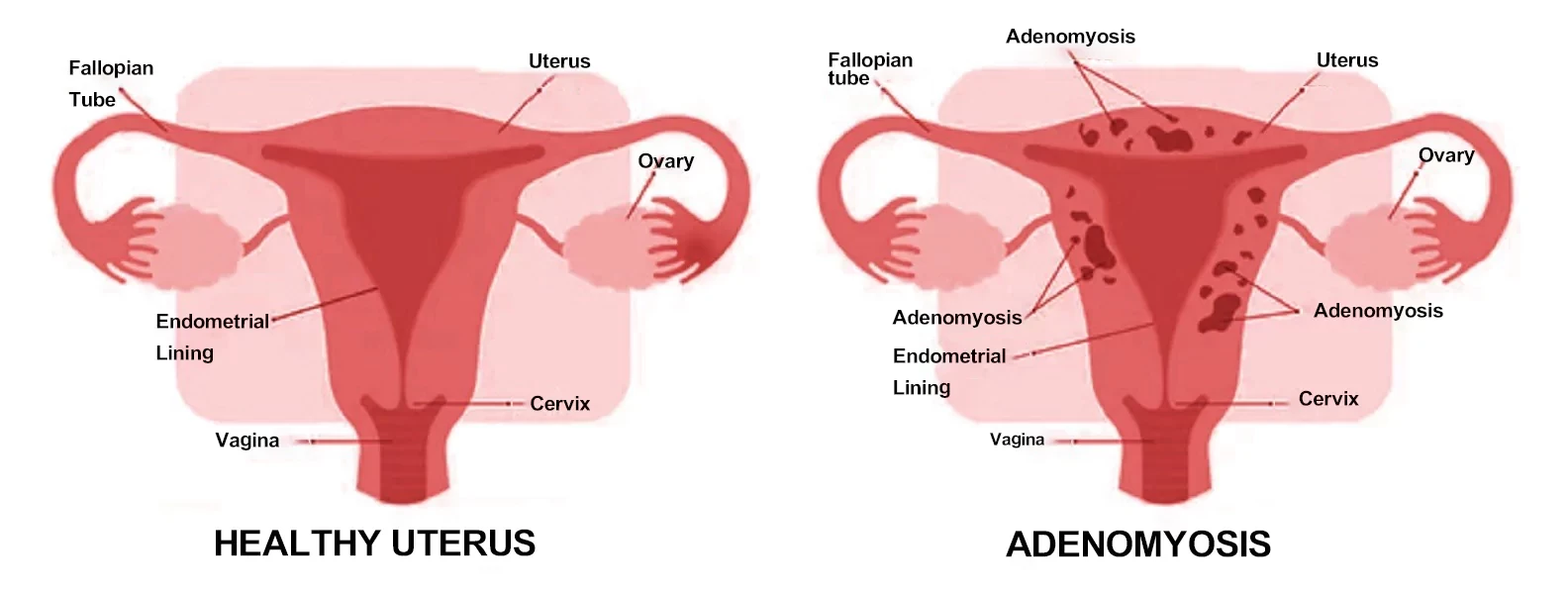
Adenomyosis is a medical condition that occurs when tissue from the lining of the uterus (endometrium) grows into the muscular wall of the uterus (myometrium). This can lead to an enlarged and tender uterus, along with various symptoms.
Here's an overview of adenomyosis, including its cause, symptoms, prevalence, diagnosis, treatment, and prognosis:
– Prevalence
Adenomyosis is a common condition, particularly in women in their 30s and 40s who have had children. The prevalence of adenomyosis varies, but it may affect up to 20-35% of women.
The exact cause of adenomyosis is not fully understood, but several theories have been proposed:
Gene alterations in some individuals will predispose for development of adenomyosis
It is believed that endometrial tissue may invade the myometrium during menstruation, childbirth or uterine surgery.
High levels of estrogen, which can stimulate the growth of endometrial tissue, may play a role in the development of adenomyosis.
Changes in hormonal balance, particularly between estrogen and progesterone, may contribute to the condition.
Chronic inflammation in the uterine lining or muscle layer may be associated with adenomyosis.
Adenomyosis can cause a range of symptoms, which may include:
Painful menstruation (dysmenorrhea) is a common symptom. The pain is often described as a deep, aching, or heavy sensation in the lower abdomen or pelvis.
Menstrual bleeding may be abnormally heavy (menorrhagia) and may be accompanied by clots.
Chronic pelvic pain, not limited to menstruation, can be a persistent symptom.
The uterus may become enlarged, leading to a feeling of fullness or pressure in the lower abdomen.
Pain or discomfort during sexual intercourse (dyspareunia) may occur.
Diagnosing adenomyosis may involve:
A healthcare provider will inquire about symptoms, medical history, and risk factors.
A pelvic examination may be performed to assess the size, shape, and tenderness of the uterus.
Transvaginal ultrasound is often used to visualize the uterus and assess for signs of adenomyosis. Magnetic resonance imaging (MRI) can provide more detailed images and may be used in some cases.
Treatment for adenomyosis aims to manage symptoms and improve quality of life. Treatment options may include:
Over-the-counter pain relievers or prescription medications may be used to manage pain and discomfort.
Procedures such as uterine artery embolization (UAE) or laparoscopic excision of adenomyosis can be considered for symptom relief.
Hormonal treatments, such as hormonal birth control methods (e.g., birth control pills, hormonal IUDs), may help control symptoms by regulating menstrual cycles and reducing the growth of endometrial tissue.
In severe cases or when other treatments are ineffective, a hysterectomy (removal of the uterus) may be recommended. This is a definitive treatment that eliminates adenomyosis but also results in loss of fertility.
– Prognosis
The prognosis for adenomyosis varies depending on the severity of symptoms and the chosen treatment approach. Many individuals can manage their symptoms effectively with medical treatment, avoiding the need for more invasive interventions like surgery. In cases where a hysterectomy is performed, the prognosis is typically excellent because adenomyosis does not recur after the uterus is removed.
It's important for individuals experiencing symptoms of adenomyosis, such as pelvic pain or heavy menstrual bleeding, to seek medical evaluation and discuss treatment options with a healthcare provider. Treatment can greatly improve quality of life for those affected by this condition.
Contact us today to schedule an appointment with Dr. Vindhya G


 Whatsapp Now
Whatsapp Now +918106688026
+918106688026